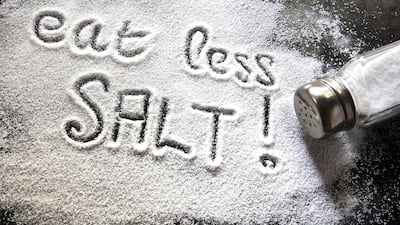Lethargy, heaviness and bloating are the uncomfortable, but all too familiar symptoms of water retention, also known as fluid retention. For some, this can appear to add inches to your body and is often mistaken for fat. It can sabotage weight-loss efforts, or at the very least hide the good results of your fat-burning programme.
Your body is naturally 70 per cent water, but excess fluid can sometimes build up in the circulatory system, body tissues and cavities of the body, contributing to that bloated look in varying degrees of severity.
Here are the most common reasons for water retention and how to address them.
Excess sodium relative to magnesium, potassium and calcium
These four alkaline minerals work within a specific ratio that is responsible for the water balance in your cells. If there is too much sodium relative to the other minerals, then excess water will begin to build in your body.
Tip: avoid all high-sodium foods, including some bottled water that my seem harmless but is actually high in sodium. Include leafy greens, bananas and superfoods such as spirulina and cacao to correct the mineral balance.
Hormonal imbalance
Fluctuations in hormones can also cause water retention and is a sign that you body needs a little extra support.
Tip: try taking vitamin B6 and magnesium supplements – these nutrients are specifically responsible for water and fluid balance.
Food intolerances
Eating foods that cause stress in your body – wheat, dairy, sugar and caffeine – will invariably create water retention if you eat them on a regular basis, since digestion is disturbed.
Tip: if you retain water and eat any of these foods daily, these are the ones to eliminate as it is highly likely they are causing the problem.
Physical stress
Too much exercise can be counter-productive when it comes to weight loss – it can create stress in your body, which induces water retention. Retaining water is also your body’s way of protecting itself.
Tip: listen to your body and exercise at a level that feels good and energising rather than exhausting.
Emotional stress
This creates acidity, tension and disrupts digestion, leading to water retention, especially around your stomach.
Tip: take steps to manage emotional stress. Meditation and deep breathing are simple but powerful ways to take you from a state of stress to one of relative ease and they are unmatched in their ability to “balance” your body.
Dehydration
Not drinking enough water causes stress in your body. It will do whatever it can to hold on to whatever water it is managing to get.
Tip: this may sound counter-intuitive, but it hydrates your body sufficiently to discourage it from storing water. Try to drink a mininum of two litres of water daily.
• Laura Holland is a well-being consultant and nutritional therapist. For more information, go to www.beutifulyou.co.uk
artslife@thenational.ae

